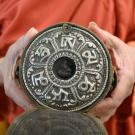Religious Studies
Find Out More
Major and minor
The major in Religious Studies examines culture at its broadest and in terms of its core values, providing an opportunity to explore and analyze the written and oral traditions of many of the world's religions, including Hinduism, Buddhism, Judaism, Christianity, Islam, and African religions. Students in the major aim to describe, compare, and interpret the beliefs and practices of various religious traditions and to understand the world in which those traditions emerged and thrive. They study how religion has shaped human behavior within cultures in matters such as family life, ideas of right and wrong, sexual roles and relations, relations between individuals and society, and artistic expression.
Real World Outcomes
With an emphasis on critical thinking skills and clear written expression, the Religious Studies major provides excellent preparation for graduate study and professional schools in law or business. Since the major integrates many different academic areas, Religious Studies majors are well prepared enter careers ranging from human service and education to private-sector professions.
More examples of what you can do with this major
Requirements
The Religious Studies major integrates religion courses with a broad spectrum of other courses from the history, philosophy, sociology, anthropology, American studies, classics, and medieval studies departments. From the start, students have a chance to design their own focus. At the lower division level, students take several courses that introduce them to the major world religions. At the upper division level, students move on to more specialized courses which deal with the more complex issues surrounding religion. Some courses include "Myth, Ritual, and Symbolism," "Contemporary American Religion," "Ch'an (Zen) Buddhism" and "Religious Ethics."

Religious Studies Majors Study What Moves People and Nations
When choosing a college major, the question of “purpose” inevitably arises for students. Read about the ways in which an emphasis in religious studies led sophomore Dinar Kurji to surprising discoveries about himself.

